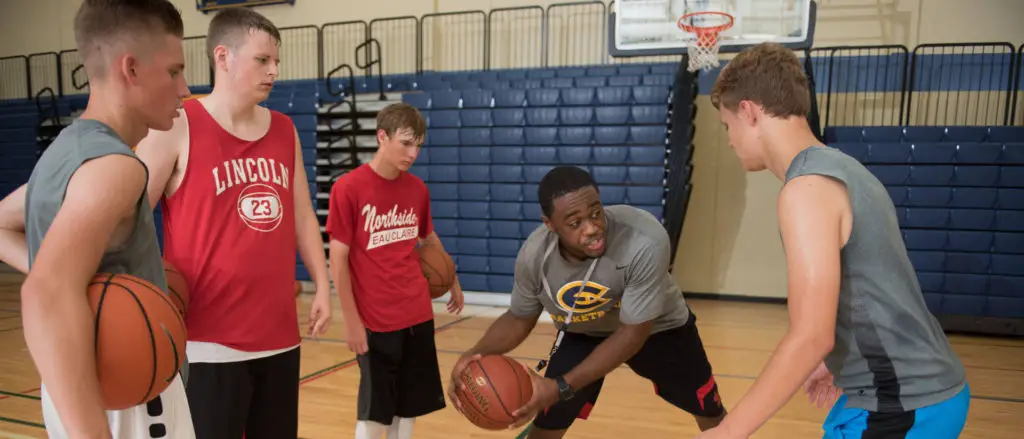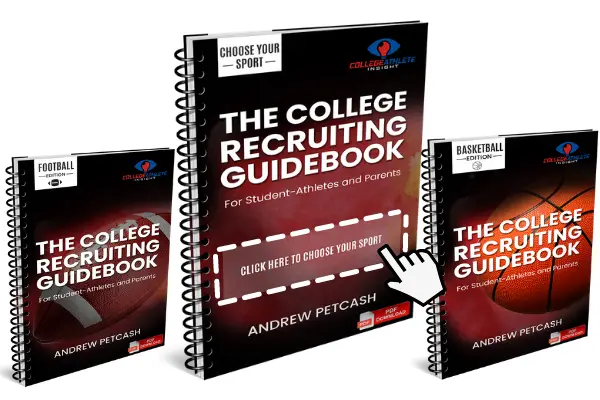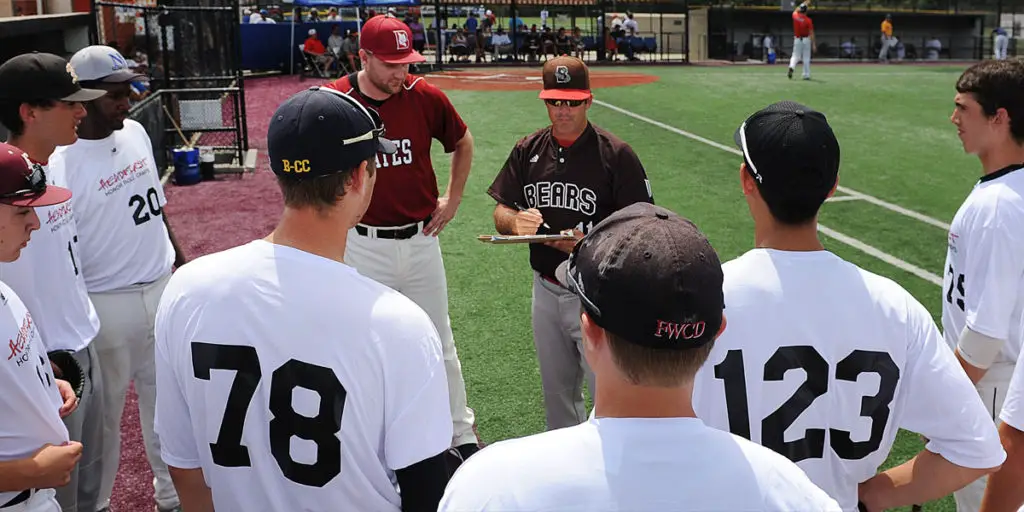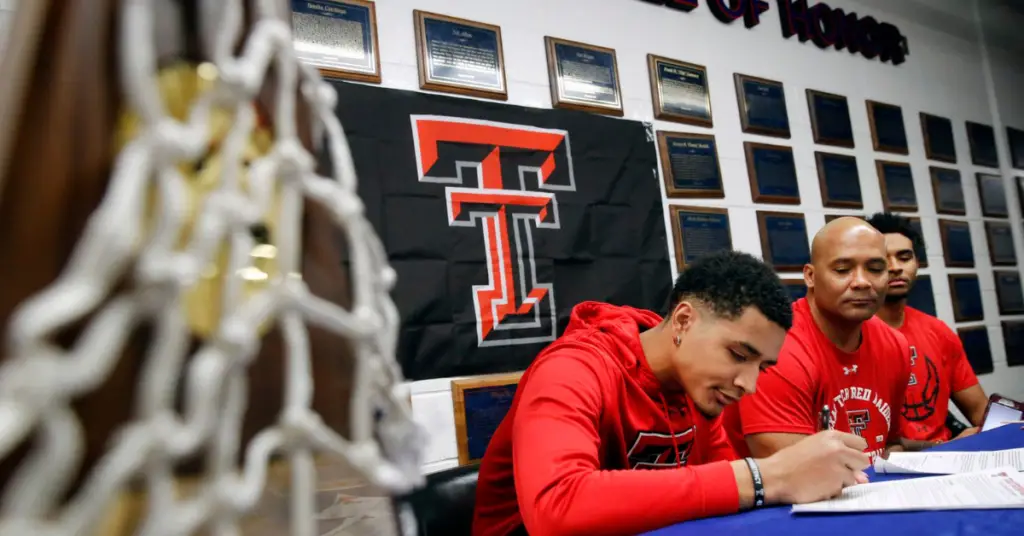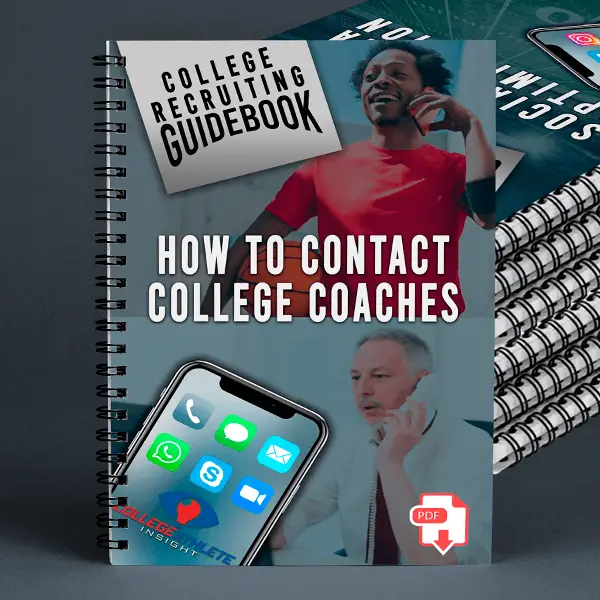Getting an athletic scholarship has been a dream of yours for quite some time, right?
The thought of getting a free education, while continuing to play the sport you love is very enticing. It would be life changing for you and your family.
Well did you know that only 7% of all high school athletes will play in college? What about the fact that only 1% of all college athletes will get a full athletic scholarship?
The truth, is that being able to earn a full ride to play in college is no easy task.
In this post, I’m going to show you 7 common mistakes to avoid if want to earn an athletic scholarship. On top of that, I will give you step-by-step instructions on what you should be doing instead.
7 Common Mistakes to Avoid if You Want an Athletic Scholarship
Warning! This article could greatly increase your chances of earning an athletic scholarship.
1. Not Getting Enough Exposure
I get it, college camps and showcases get a bad rep.
They’re expensive, there’s hundreds of kids, you usually have a ball-hog on your team, and the coaches/scouts don’t seem to be interested in you. More often than not, camps seem to be a bad investment.
However, going to events like these are critical in your college recruiting journey. The only stipulation is that you have to pick the right ones.
With so many kids to choose from there’s a high possibility that you could slip through the cracks unless you get the right exposure.
We all know that kid who has no offers, but is way more talented than the kid in your area with a handful of offers. Heck, that kid might even be you.
That is why getting exposure is important. You have to get your name in front of scouts and college coaches.
This is primarily accomplished by going to college camps as well as scouting events run by reputable companies. You’ll have no problem finding events like these, but don’t just sign up for the first one you see.
It wouldn’t be wise to sign up for an expensive camp without doing the proper due diligence. If a high academic Division 3 school is your goal then try to find camps that fit that profile.
Make sure to do your research, ask questions, and decide if the event is the right for YOU.
2. Believing Your Current Coaches Will Take Care of Your Recruiting
The classic phrase I hear all the time is “my high school/travel coach is taking care of my recruiting”. This is a No-No!
It’s your future on the line not there’s.
You need to take control of your own destiny. Your coaches are going to play a role throughout the process, but you can’t rely on them to do everything.
Remember, you’re not the only player on the team that is going to need assistance from the coach. Make sure you are contacting college coaches, setting up visits, figuring out camps, calculating financial aid, and building relationships.
When I went through the college recruiting process my high school coach had no clue what he was doing and didn’t know how to talk to college coaches. My AAU coach on the other hand was super helpful and had hundreds of great contacts he was able to set me up with.
Your current coaches are someone to lean on, but make sure you are doing your part to ensure a successful recruiting journey.
The College Recruiting Guidebook
The college recruiting guidebook is the ultimate manual to earning an athletic scholarship for student-athletes and parents.
How would a $50,000/year athletic scholarship change your families life?
Inside the guidebook you’ll have access to:
- step-by-step instructions freshman through senior year
- every single college coaches email in the country (broken up by division and school)
- sample email/dm/text templates you can use
- a manual for parents on how to negotiate scholarships/financial aid with college coaches
- access to an array of bonuses you won’t find anywhere else
Parents will pay $20 just for admission in to their kids game. You can get this guidebook for the same price.
The college recruiting guidebook could literally change your families future!
3. Not Contacting Coaches Yourself
This ties in with mistake #2, but if you aren’t reaching out to coaches yourself then how will they know who you are?
College recruiting is very similar to networking in the business world. More often than not it comes down to relationships and who you know.
Think about that one kid in your area who is just “ok” but has a bunch of college scholarship offers. It’s frustrating, right?
That kid probably has some connections.
His dad is friends with the college coach or his mom donates money to the boosters. It might seem unfair, but life is unfair so get on with it and start building relationships yourself.
A good goal to set is reaching out to one new college coach every day. You can accomplish this by email, phone, or direct message on social media.
Make sure when contacting a coach that you start out with a “catchy” subject line to garner their attention. Coaches receive lots of messages so it’s important that yours stands out.
(How to contact a college coach and get a response back guaranteed)
And remember, if you never reach out to a coach you’ll never know what could have been.
4. Thinking You Deserve an Athletic Scholarship
There’s millions of student-athletes around the world that coaches can choose from.
WHY would they want you? HOW would they know who you are? WHAT separates you from everyone else?
This is so important and something you should take a few minute to reflect on.
Just because you averaged 3 goals a game or scored 25 points versus the best team in your district or held a kid with ten Division 1 offers to 12 points does not entitle you to an athletic scholarship.
It’s a daily effort that requires a lot of consistency to make it to the collegiate level. You are constantly being evaluated and one bad move could seriously jeopardize your chances.
Bring your “A” game everyday because you never know who’s watching. This applies to games, practice, school, lifting, and social events.
Make the most of every opportunity and don’t forget to have fun. An athletic scholarship is well within your reach, you just have to go out and make it happen.
5. Letting Parents Control the Entire Process
A statistic recently came out and it said that 99.9% of college coaches would rather talk to the student-athlete than his/her parents.
College coaches will be dealing with the athlete everyday on campus, not the parents. Don’t get it twisted, parents still play a major role but when communicating the prospective athlete should be the one taking the lead.
This will show the student-athletes character and the desire to create a future they want, not a future the parents want for them. Way too often I see parents trying to convince their kid to go to a school that they are intrigued by.
(Related: How Parents Should Act at Recruiting Events)
I went through the same thing, my mom fell in love with a certain school who was recruiting me and did everything in her power to convince me that I should go there.
It created a lot of problems and she’ll even admit today that she was wrong to do that as the school wasn’t a good fit for me. Luckily, I ultimately decided to go elsewhere.
The college recruiting process is a team effort with both the parents and athlete playing important roles.
As an athlete – make sure you’re the one contacting coaches, building a relationship, asking questions, and determining if it is a school you would be interested in.
As a parent – you want to be assisting your son/daughter, providing advice, dealing with the financial aid talks, and being there to support them with whatever decision that end up making.
6. Limiting Your Options
The worst phrase I repeatedly hear from student-athletes is “D1 or bust”.
Not only is it a terrible attitude, but it also shows a lack of knowledge about the other options that exist within college athletics.
Of course, everyone wants to play at the big state school in front of thousands of fans, but the reality is that only a select few will get that opportunity. I always say “dream big and go for it all”.
My Recruiting Story
Personally, it was my dream since I was 7 years old to play basketball at the University of Pittsburgh ever since my Dad started taking me to games. Trust me, I did everything in my power to make that happen.
I got super close and even did a private workout with some of the coaches once I started earning other Division 1 offers. Ultimately though, it wasn’t meant to be and I ended up going to Boston University in the Patriot League – which turned out to be the best thing that could have ever happened to me.
Reflecting back, I realize that my recruiting was all over the place and will be for most of you as well. I had offers from every single level including D1, D2, D3, NJCAA, and even NAIA.
(The major differences between D1, D2, and D3 sports)
I made so many mistakes when I was going through the recruiting process and they nearly costed me all of my offers. My Dad and I didn’t know what we’re doing and it nearly came back to bite us in the butt.
It is in your best interest to learn about each level and research about the schools who are interested in your abilities. You’ll be amazed when you find out that some local NAIA school can offer you a 75% scholarship and that Division 2 school can only offer you 25%.
That is why it is so important to do your research, ask questions, and seek consulting when needed.
7. Not Seeking Help
The recruiting process is very complex and many families get lost in what they need to be doing. There’s more to it than just putting up impressive stats and getting good grades.
You have to find the right camps, make an eye-catching highlight tape, be on the right travel teams, take the right classes to be eligible, build relationships with coaches, set up visits, work with your guidance counselor, and a whole lot more.
A very small percentage of high school athletes will get the opportunity to play in college. It is super important that you get help when you need it because it could be the difference between receiving a free education and paying student-loans for the rest of your life.
My two brothers and I saved our family approximately $750,000 by getting full athletic scholarships.
Obviously, it wasn’t completely free because we worked our butts off and our Dad payed for us to play on a travel team, but it was one heck of a return on investment.
Please contact the CAI team today if you need some recruiting assistance. Every single person at College Athlete Insight has either played or coached at the collegiate level.
Wrap Up of Getting an Athletic Scholarship
I hope this article gave you some perspective on what you need to do (and not do) if you want to earn an athletic scholarship.
Will it be easy? Probably not. Will it be worth it? 100%.
While playing in college I had some of the best years of my life.
I would highly recommend that anyone who has the chance to play at the collegiate level jumps on that opportunity.


